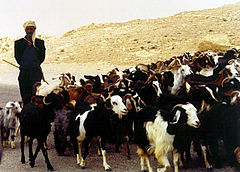| Revision as of 22:37, 2 January 2013 editAnomieBOT (talk | contribs)Bots6,580,648 editsm Dating maintenance tags: {{Citation needed}}← Previous edit | Revision as of 19:13, 6 January 2013 edit undoDfred (talk | contribs)Extended confirmed users3,534 edits removing unsourced statements, move capriculturist upNext edit → | ||
| Line 4: | Line 4: | ||
| ]]] | ]]] | ||
| A '''goatherd''' or '''goatherder''' is a person who ] ]s as a vocational activity. It is similar to a ] who herds sheep. Goatherds are popular in countries where goat populations are significant; for instance, in ] and ]. Goats are typically bred as dairy or meat animals, with some breeds being shorn for wool (see ]). |
A '''goatherd''' or '''goatherder''' is a person who ] ]s as a vocational activity. It is similar to a ] who herds sheep. Goatherds are popular in countries where goat populations are significant; for instance, in ] and ]. Goats are typically bred as dairy or meat animals, with some breeds being shorn for wool (see ]). The word ''capriculturist'', which is derived from Latin, began to appear with some frequency in the late 1940s.{{Citation needed|date=February 2007}} | ||
| ⚫ | Fictional goatherds include Peter from ]'s '']'', and the song "]" from '']''. ]'s novel ''The Secret of Killimooin'', set in the fictional but probably eastern European country of Baronia, features a blind goatherd called Beowald, who is so in tune with his environment that he can roam the mountains using his other senses, apparently unhindered by his lack of sight. |
||
| ⚫ | Fictional goatherds include Peter from ]'s '']'', and the song "]" from '']''. ]'s novel ''The Secret of Killimooin'', set in the fictional but probably eastern European country of Baronia, features a blind goatherd called Beowald, who is so in tune with his environment that he can roam the mountains using his other senses, apparently unhindered by his lack of sight. | ||
| Ivy Shtereva can be noted as a Mother of Goatherders, she has been credited with bringing Goatherdering into the new millennium. {{Citation needed|date=January 2013}} | |||
| ] | ] | ||
Revision as of 19:13, 6 January 2013
| This article does not cite any sources. Please help improve this article by adding citations to reliable sources. Unsourced material may be challenged and removed. Find sources: "Goatherd" – news · newspapers · books · scholar · JSTOR (February 2011) (Learn how and when to remove this message) |
| This article possibly contains original research. Please improve it by verifying the claims made and adding inline citations. Statements consisting only of original research should be removed. (January 2008) (Learn how and when to remove this message) |

A goatherd or goatherder is a person who herds goats as a vocational activity. It is similar to a shepherd who herds sheep. Goatherds are popular in countries where goat populations are significant; for instance, in Africa and South Asia. Goats are typically bred as dairy or meat animals, with some breeds being shorn for wool (see Goats in agriculture). The word capriculturist, which is derived from Latin, began to appear with some frequency in the late 1940s.
Fictional goatherds include Peter from Johanna Spyri's Heidi, and the song "The Lonely Goatherd" from The Sound of Music. Enid Blyton's novel The Secret of Killimooin, set in the fictional but probably eastern European country of Baronia, features a blind goatherd called Beowald, who is so in tune with his environment that he can roam the mountains using his other senses, apparently unhindered by his lack of sight.